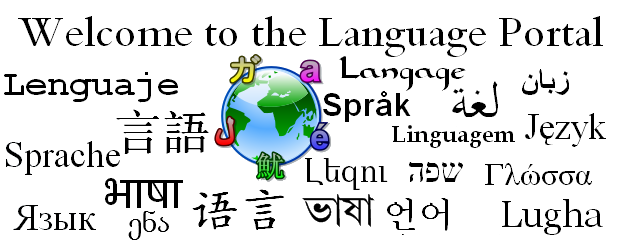Portal:Language
|
A language is a system of symbols, generally known as words, and the grammatical and other rules by which they are manipulated. The word language is also used to refer to the whole phenomenon of language, and in this sense language is one of several forms of human communication. The scientific study of language and languages, including their historical development, characteristics, and use in society, is the field of linguistics. Human language is a natural phenomenon, and language learning is instinctive in childhood. In using language, people use patterns of sound or gesture to convey the words and rules of language, or they represent these patterns in codes such as writing. There are thousands of languages, historically related to each other in many language families, and they share a number of common properties. Besides using naturally acquired language, people have consciously crafted languages such as Esperanto and Klingon. Lua error in package.lua at line 80: module 'Module:Box-header/colours' not found. The Georgian language (ქართული [kartʰuli] kartuli) is a Kartvelian language spoken by Georgians. It is the official language of Georgia, a country in the Caucasus.Georgian is written in its own unique Georgian alphabet. Georgian is the primary language of about 4 million people in Georgia itself, and of another 500,000 abroad. It is the literary language for all regional subgroups of the Georgian ethnos, including those who speak other Kartvelian (South Caucasian) languages: Svans, Mingrelians, and the Lazs. Judaeo-Georgian is spoken by an additional 20,000 in Georgia and 65,000 elsewhere (primarily 60,000 in Israel). Lua error in package.lua at line 80: module 'Module:Box-header/colours' not found. The Phoenician alphabet was a non-pictographic consonantal alphabet, or abjad. It became one of the most widely used writing systems, spread by Phoenician merchants across the Mediterranean world, where it evolved and was assimilated by many other cultures. The Aramaic alphabet, a modified form of Phoenician, was the ancestor of modern Arabic script, while Hebrew script is a stylistic variant of the Aramaic script. The Greek alphabet (and by extension its descendants such as the Latin, the Cyrillic and the Coptic), was a direct successor of Phoenician, though certain letter values were changed to represent vowels. Lua error in package.lua at line 80: module 'Module:Box-header/colours' not found. The Museum of the Portuguese Language (Portuguese: Museu da Língua Portuguesa; Brazilian Portuguese: [muˈzew dɐ ˈlĩgwɐ puʁtuˈgezɐ]) is an interactive Portuguese language — and Linguistics/Language Development in general — museum in São Paulo, Brazil. It is housed in the Estação da Luz railway station, in the urban district of the same name. The choice of the building for the launching of the museum is connected to the fact that it was mainly here that thousands of non-Portuguese speaking immigrants arriving from Europe and Asia into São Paulo via the Port of Santos got acquainted with the language for the first time. The idea of a museum-monument to the language was conceived by the São Paulo Secretary of Culture in conjunction with the Roberto Marinho Foundation, at a cost of around 37 million reais.The objective of the museum is to create a living representation of the Portuguese language, where visitors may be surprised and educated by unusual and unfamiliar aspects of their own native language. Secondly, the caretakers of the museum, as expressed on the official website, "desire that, in this museum, the public has access to new knowledge and reflection in an intense and pleasurable manner," as it notices the relationship of the language with others, as well as its proto-languages. The museum targets the Portuguese speaking population, made up of peoples from many regions and social backgrounds, but who still have not had the opportunity to gain a broader understanding of the origins, the history and the continuous evolution of the language. Lua error in package.lua at line 80: module 'Module:Box-header/colours' not found.
Languages of Africa: Arabic, Komering, Chadic, Cushitic, Kanuri, Maasai, Setswana, Swahili, Turkana, Xhosa, Yoruba, Zulu, more... Languages of the Americas: Aleut, Carib, Cherokee, Inuktitut, Iroquois, Kootenai, Mayan, Nahuatl, Navajo, Quechuan, Salish, American Sign Language, more... Languages of Asia: Arabic, Bengali, Chinese, Japanese, Hebrew, Hindustani, Kannada, Marathi, Korean, Kurdish, Malayalam, Mongolian, Persian,Rajasthani, Sindhi, Sanskrit, Tamil, Tanchangya, Telugu, Tibetan, Thai, Turkish, Vietnamese, Khowar, more... Languages of Austronesia: Austric, Fijian, Hawaiian, Javanese, Malagasy, Malay, Maori, Marshallese, Samoan, Tahitian, Tagalog, Tongan, Auslan, more... Languages of Europe: Basque, Czech, Danish, Dutch, English (book), French, German, Greek, Italian, Latin, Leonese, Norwegian, Polish, Portuguese, Romanian, Russian, Slovak, Spanish, more... Constructed languages: Esperanto, Ido, Volapük, more... Agglutinative language, Analytic language, Constructed language, Creole, Context-free language, Extinct language, Dialect, Fusional language, Inflectional language, International language, Isolating language, Language isolate, National language, Natural language, Pidgin, Pluricentric language, Polysynthetic language, Proto-language, Sign language, Spoken language, Synthetic language, Variety (linguistics) Applied linguistics, Cognitive linguistics, Accent (dialect), Computational linguistics, Descriptive linguistics, Eurolinguistics, Generative linguistics, Historical linguistics, Lexicology, Lexical semantics, Morphology, Onomasiology, Phonetics, Phonology, Pragmatics, Prescription, Prototype semantics, Psycholinguistics, Semantics, Stylistics, Sociolinguistics, Syntax See also: List of linguists Alphabets: Arabic alphabet, Cyrillic alphabet, Hebrew alphabet, Latin alphabet, more... Other writing systems: Abjad, Abugida, Braille, Hieroglyphics, Logogram, Syllabary, SignWriting, more.. See also: History of the alphabet, Script Template:/box-footer Template:/box-header Linguistics: Computational linguistics • Grammar • Historical linguistics • Morphology • Phonetics • Phonology • Pragmatics • Reading • Semantics • Sociolinguistics • Syntax • Writing Languages: Language families • Pidgins and creoles • Sign languages Linguists: By nationality • Grammarians • Historical linguists • Morphologists • Phoneticians • Phonologists • Sociolinguists • Syntacticians • Translators Stubs: Constructed languages • Languages • Linguists • Pidgins and creoles • Typography • Vocabulary and usage • Writing systems Template:/box-footer
|



